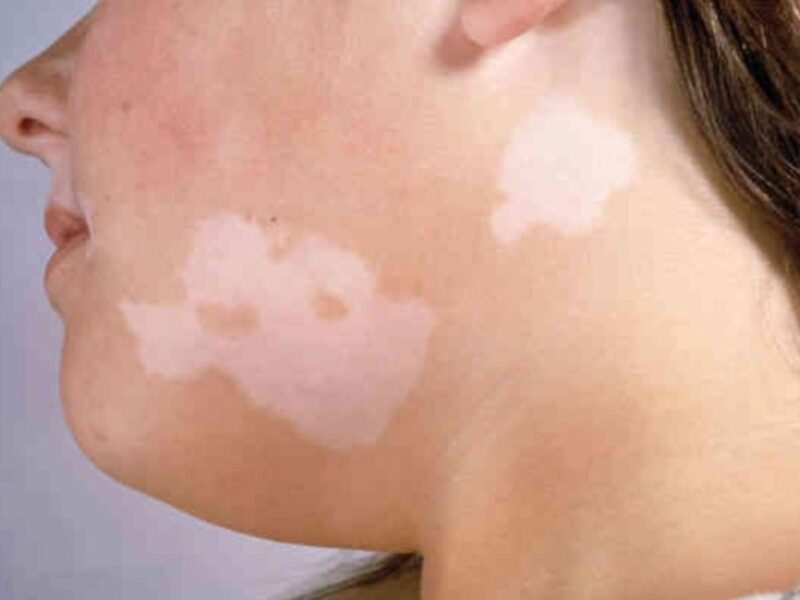Skin discoloration, often manifesting as dark patches or uneven skin tone, can be a source of discomfort for many. It’s caused by an overproduction of melanin, the pigment responsible for skin and hair color. Factors such as sun exposure, hormonal changes, certain medications, and skin inflammation can contribute to this condition.
Melanin is the pigment that gives color to our skin, hair, and eyes. Its primary function is to protect the skin from damaging UV rays. However, when the skin produces too much melanin, it leads to hyperpigmentation or dark spots. This overproduction can be triggered by various factors, including sun exposure, inflammation, hormonal changes (as seen in pregnancy or with birth control pills), and aging.
Common Types of Skin Discoloration
- Melasma: Often called the “mask of pregnancy,” melasma is characterized by brown to gray-brown patches, usually on the face. It’s more common in women, especially during pregnancy.
- Sun Spots: Also known as age spots or liver spots, these are common in adults older than 50. However, younger people can get them too, especially if they spend a lot of time in the sun.
- Post-Inflammatory Hyperpigmentation (PIH): This occurs following skin injury or inflammation (like cuts, burns, or acne). It leaves darkened patches or spots on the skin.
Natural Ingredients for Skin Lightening
Nature offers a plethora of ingredients that can help lighten dark patches and even out skin tone. These remedies are gentle, usually well-tolerated, and can be easily found in your kitchen or garden.
Aloe Vera
Aloe Vera is renowned for its healing properties. It not only soothes sunburn but also helps in treating hyperpigmentation. Aloe contains aloin, a natural depigmenting compound that has been shown to lighten skin and work effectively as a nontoxic hyperpigmentation treatment.
Lemon Juice
Lemon juice is rich in Vitamin C, which is a potent antioxidant and has skin-lightening properties. Applying fresh lemon juice to the affected areas can gradually fade dark spots. However, lemon juice can be irritating to some skin types and should be used with caution.
Turmeric
Turmeric contains curcumin, which has antioxidant and anti-inflammatory properties. It reduces melanin production and is effective in treating skin hyperpigmentation and dark spots.
Green Tea Extract
Green tea is packed with antioxidants and has been shown to have a depigmenting effect when applied to the skin. It contains catechins which help in reducing hyperpigmentation.
Yogurt or Milk
Both yogurt and milk contain lactic acid, an AHA (Alpha Hydroxy Acid) that exfoliates the skin, which can lead to a reduction in hyperpigmentation.
Honey
Honey is a natural moisturizer and is also known for its antioxidant and anti-inflammatory properties. It helps in removing dead skin cells and rejuvenating the skin.
Daily Skin Care Routine
A consistent skincare routine is crucial for managing skin discoloration. This routine should include gentle cleansing, moisturizing, and most importantly, sun protection.
Cleansing
Use a gentle cleanser that doesn’t strip your skin of its natural oils. Cleansing helps in removing dirt and pollutants which can contribute to skin discoloration.
Moisturizing
A good moisturizer helps in maintaining the skin’s barrier function and prevents dryness, which can worsen pigmentation issues.
Sun Protection
Sun exposure can exacerbate skin discoloration. Using a broad-spectrum sunscreen with an SPF of 30 or higher is essential, even on cloudy days.
Lifestyle Adjustments
Lifestyle changes can significantly impact the health of your skin.
Diet and Hydration
A balanced diet rich in antioxidants, vitamins, and minerals promotes healthy skin. Hydration is equally important; drinking plenty of water helps in flushing out toxins that can affect your skin’s health.
Stress Management
Chronic stress can negatively affect your skin. Practices like yoga, meditation, and regular exercise can help in managing stress.
Adequate Sleep
Quality sleep is crucial for skin health. It’s during sleep that your skin repairs and regenerates itself.
Medical Treatments
If home remedies and lifestyle changes don’t yield the desired results, it’s advisable to consult a dermatologist. Medical treatments for skin discoloration include:
- Topical Creams: Creams containing hydroquinone, tretinoin, corticosteroids, or other skin-lightening agents.
- Chemical Peels: Using acid solutions to remove the top layer of the skin, reducing the appearance of dark spots.
- Laser Therapy: High-intensity light to remove or reduce hyperpigmentation.
FAQs
Can drinking more water help reduce skin discoloration?
Yes, staying hydrated can indirectly assist in skin health. Water helps in flushing out toxins from the body and maintaining skin hydration, which is essential for healthy skin regeneration. While it may not directly lighten skin discoloration, proper hydration supports overall skin health and can enhance the effectiveness of other skin treatments.
Are there any specific dietary changes that can help with skin discoloration?
Incorporating foods rich in antioxidants, vitamins E and C, and Omega-3 fatty acids can benefit skin health. These nutrients can help protect the skin from damage and support skin repair. Foods like berries, nuts, green leafy vegetables, and fatty fish are excellent choices.
How long does it typically take to see results from home remedies for skin discoloration?
The time it takes to see results can vary widely depending on the individual’s skin type, the severity of the discoloration, and the specific home remedy used. Generally, it might take several weeks to a few months of consistent application to notice visible changes.
Can stress cause skin discoloration to worsen?
Yes, stress can impact skin health and potentially worsen skin discoloration. Stress can trigger hormonal imbalances and inflammation, which can exacerbate hyperpigmentation. Managing stress through relaxation techniques and adequate sleep can be beneficial for skin health.
Is it safe to use multiple home remedies simultaneously for faster results?
It’s important to be cautious when combining different home remedies. Using multiple treatments at once can sometimes lead to skin irritation or worsen the condition. It’s best to try one remedy at a time or consult a dermatologist before combining treatments.
Can regular exercise have any impact on skin discoloration?
Regular exercise can improve overall circulation and contribute to healthier skin. Increased blood flow can help nourish skin cells, promote the healing of damaged skin, and reduce inflammation. While exercise alone may not directly reduce skin discoloration, it contributes to general skin health and well-being.
Final Words
While skin discoloration can be a persistent issue, combining home remedies with proper skincare, lifestyle changes, and possibly medical treatments can yield significant improvements. Remember, each skin type is different, and what works for one person may not work for another. Patience and consistency are key, and when in doubt, a dermatologist’s advice should be sought.

